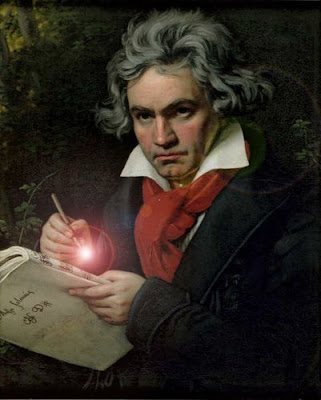 by Sarah Filley
by Sarah FilleyWithout collaboration, the musical world would be only half of what it is now. For every artist, there is an accomplice; every genre, a network of support; and every creative triumph, a coalition of colleagues in the background. It is, arguably, impossible to create good art without the influence of another source, no matter how minor or subconscious it may be. Thus, the question arises: where do you draw the line between synergy and a blatant rip off?
Through the 1950s and early 1960s, young, white Pat Boone hit the charts with 38 Top Forty singles. Most of these were covers lifted predominantly from African American artists such as Little Richard. Cover music originated on a rocky foundation, shamelessly taking the music of black artists and putting a white face on it to make it acceptable. It wasn’t until African American artists, such as Ray Charles, covered the music of white artists and topped the charts, that cover music relinquished its blatantly racist overtones.
If one looks at cover music today it can show how the work of some of the most esteemed and respected artists is passed along and used to further musical innovation. Artists, such as John Mayer, have recreated famous tracks, like Tom Petty’s "Free Fallin'" or Ray Charles' "I Don’t Need No Doctor" (first covered by Humble Pie) and made them new. Nirvana shone a new light on David Bowie’s song "Man Who Sold the World" and Jimi Hendrix took Bob Dylan’s "All Along the Watchtower" to the Top Forty charts. David Bowie and Iggy Pop both succeeded in making "China Girl" a hit. Joni Mitchell’s heartfelt protest ballad "Big Yellow Taxi" also found success and air time when recorded by the Counting Crows. Guns N' Roses peaked when they re-recorded Dylan’s "Knocking on Heaven’s Door." Dylan, himself, one of the most frequently covered artists, along with Hendrix, has reworked countless Woody Guthrie tunes, as well as, some of the songs that made Elvis Presley and Johnny Cash famous.
Cover music can also, however, undermine the creativity of the original artist. For example, who remembers that Janis Joplin’s "Piece of my Heart" was originally recorded by Erma Franklin? In the case of Roy Orbison’s "Pretty Woman," many people identify only with Van Halen’s recording. UB40 took Neil Diamond’s "Red Red Wine" and made it truly their own. The song "Hallelujah" has been covered so many times; I challenge you to find someone who knows the original artist.
When artists take music that isn’t theirs and improve it to the point where listeners don’t even realize it is a cover, we see the artistic license at work. Arguably, there is always the potential that cover music will damage a musical career or mentally defeat an artist. But the fact is without it, the music we love would not be the same. The results of musical collaboration are portals for the emergence of the tracks we consider to be genius. However, covering another artist’s songs should always be done out of respect, not for selfish purposes.
(The photo of Bob Dylan performing at the 1963 March on Washington is from the U.S. Information Agency and is in the public domain. To see a video of Humble Pie performing their cover of "I Don't Need No Doctor" from a concert in 1971, please check below.)
music
cover music
Little Richard
Ray Charles
Jimi Hendrix
Bob Dylan
Humble Pie
John Mayer
Add to Technorati Favorites










